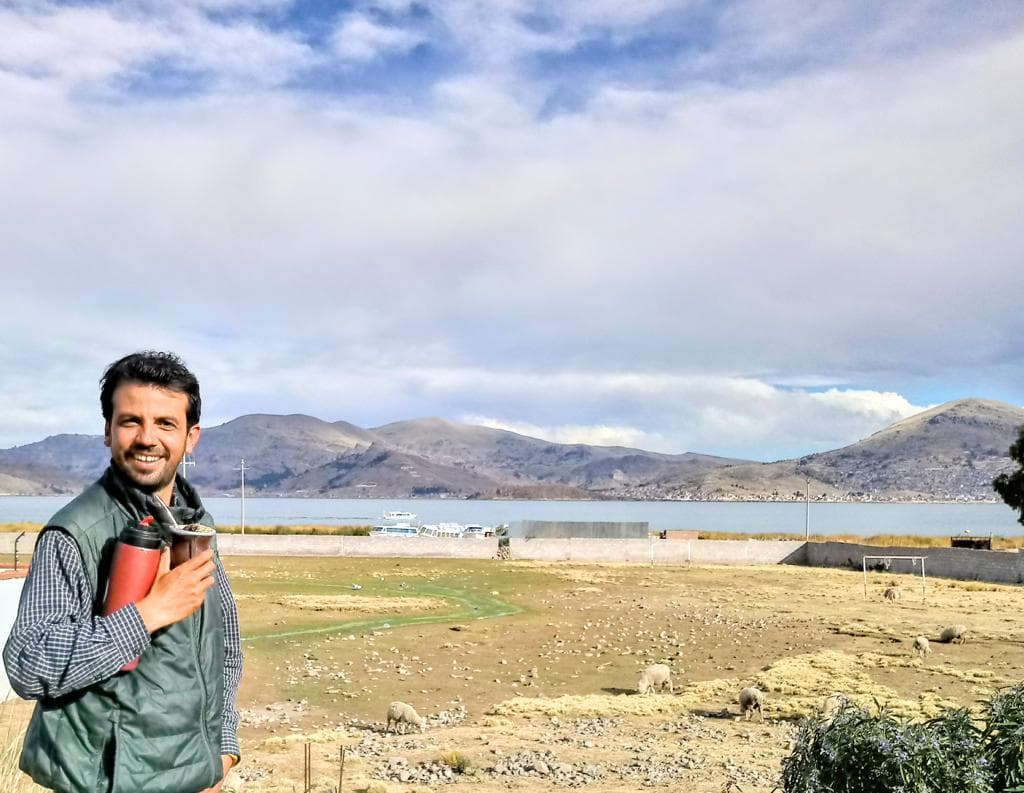SÃO PAULO, Brazil – Experiencing in a radical way the Franciscan charisma of itinerancy and humility, a Brazilian Capuchin friar intends to travel the whole world on foot.
Wherever he goes, Father Marcelo Monti talks not only about the values of his congregation, but also about the prevention of HIV/AIDS, which took the life of his sister 10 years ago. In 11 months, he has already walked 3,600 miles through six countries, but still has a long way to Quebec on the first stage of his journey.
Monti walks on average 18 miles each day, carrying all his belongings in a cart. He doesn’t have any money and depends exclusively on donations and on the hospitality of the people he meets in the cities and towns he travels through.
“Only three times I wasn’t welcomed by the people who would host me – unfortunately, they were priests in all three cases,” he told Crux. But Monti said he prefers to remember the numerous times people were welcoming and even gave him their own bed.
“Along the trip, I learned to trust the goodness of the people. I know that there will always be someone that will invite me to their home,” the friar said.
It all started last year, on August 26 – the day he turned 40. Monti left the Brazilian city of Pelotas and walked through Uruguay, Argentina, Bolivia, Chile and Peru. He sometimes had to pay for lodging – using money from donations – or slept in his tent. He usually walks alone, but at times a fellow Capuchin friar or young community members accompanied him during small parts of his journey.
“Maybe due to the Franciscan charisma, I feel very integrated to the environment when I’m alone, and it’s not a problem for me. This way, I’m also very open to know people everywhere,” he told Crux.
Monti doesn’t wear his congregation’s habit while walking, explaining that for Saint Francis of Assisi, the habit was the garment of a destitute man.
“Being a religious person, he didn’t want to be treated differently from the other people, on the contrary,” he explained. With civilian clothes, Monti wants to avoid any possible privilege.
“I’m a dark-skinned Latino-American and the people who see me on the road pushing my cart can take me for a poor wanderer. I want to feel the way these people feel,” he said.
There are currently thousands of Venezuelans migrating throughout South America, fleeing political and economic turmoil in their country and pursuing a better life. Monti has met with many of them.
“I once arrived at a city in Peru and realized that people were staring at me. I asked a man what was happening, and he told me people thought I was a Venezuelan and feared I’d rob them or ask them for money. I didn’t tell anybody I wasn’t a Venezuelan – I wanted to be treated properly not because I’m from Brazil, but because I’m a human being,” he said.
When he gives interviews about his journey – at this point, there have been at least 70 with local newspapers, radio stations, and TV programs – he now talks about the prejudice Venezuelans suffer in the neighboring countries and relates it with the stigmatization faced by HIV-positive people.
“Imagine what it is to be seen with mistrust and to know that people fear touching your hand. Unfortunately, prejudice is real and long-lasting,” Monti told Crux.
The first impetus for his journey came when he was a novice and his superior told him about the beginnings of the Franciscans and the idea of itinerancy.
“There’s a text in which Saint Francis calls us to live as pilgrims and strangers in this world. I always think about it,” he said.
In that first experience, he roamed with a colleague for thirteen days, with no money. He did two other short journeys, but then wanted to do something more profound, noting “this is a permanent mission for some of our provinces.”
Monti named his journey Caminho de Aline – Uma Volta ao Mundo Pela Vida e Contra a AIDS (Aline’s Way – Around the World for Life and Against AIDS), in honor of his sister. According to his initial itinerary, he should be in Ecuador by now, but he’s still in Cusco, Peru. “After that I’m heading to Colombia and then I’ll take a plane to the Dominican Republic. I’m spending two months there and in Haiti, where I have been a missionary in the past. After that, I’m taking a plane back to Panama and will walk north to Quebec.”
He then plans to fly from Canada to Senegal and continue walking through several countries in Africa, Eastern Europe and Asia – always speaking about AIDS, prejudice and hope.
“I’m doing this in a very ordinary way, just walking. So I think people can find out other simple ways of thinking about solutions, and giving people hope.”
Crux is dedicated to smart, wired and independent reporting on the Vatican and worldwide Catholic Church. That kind of reporting doesn’t come cheap, and we need your support. You can help Crux by giving a small amount monthly, or with a onetime gift. Please remember, Crux is a for-profit organization, so contributions are not tax-deductible.
















